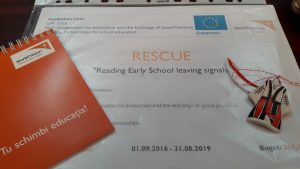During March and April 2017, the teachers in the two RESCUE partner schools in Romania – Cosereni School, Ialomita and Mihai David School in Negresti, Vaslui have been actively involved in gathering data ab out the ESL in their schools and neighbouring school communities as well. 100 questionnaires and 39 interviews were applied to teachers, principals and other school stakeholders in an attempt to document the main Strengths, Weaknesses, Opportunities and Threats that the school teachers are facing in effectively involving in ESL prevention and intervention. We were positively impressed by the level of response and interest we have discovered in the respondents, given the fact that many of them were not teaching in the partner schools. The explanation we could find is that the teachers have become more aware of their role and responsibility in preventing and combating ESL in their schools.
out the ESL in their schools and neighbouring school communities as well. 100 questionnaires and 39 interviews were applied to teachers, principals and other school stakeholders in an attempt to document the main Strengths, Weaknesses, Opportunities and Threats that the school teachers are facing in effectively involving in ESL prevention and intervention. We were positively impressed by the level of response and interest we have discovered in the respondents, given the fact that many of them were not teaching in the partner schools. The explanation we could find is that the teachers have become more aware of their role and responsibility in preventing and combating ESL in their schools.


About the author